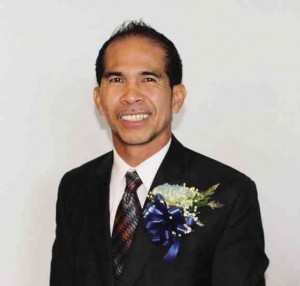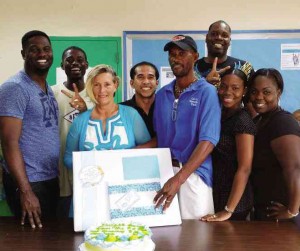Filipino teaches kids math in the Bahamas

ARIEL ALACABA arrived in Nassau, New Providence on Dec. 31, 2003. He was recommended by a Filipino friend to an employer in the Islands. He was interviewed through phone and afterwards processed all the documents to work there.
Since the ’60s, the Bahamas, a small member of the British Commonwealth, has been home to a few Filipinos. At present, there are more than 1,000 Filipino workers mostly in the domestic sectors as housekeepers, cooks, medical workers and hotel employees. Filipino teachers also find their way in this territory of 700 islands.
Among them is Ariel Alacaba, who arrived in Nassau, New Providence on Dec. 31, 2003. He was recommended by a Filipino friend to an employer in the islands. He was interviewed by phone and afterwards processed all the documents to work there.
“I was a teacher in a government school in the Philippines. But I chose to go abroad because the salary was not enough to provide for my family, as I am the only one working. My wife takes care of our two children,” he explains.
All-around domestic helper
“I was supposed to work as a gardener, as specified in the contract, but it turned out I became an all-around domestic helper to a Greek family here,” he recalls. Although the salary was good, he knew that he was exploited. He signed for a one year contract.
“I never thought that I could find a job that would fit my qualifications,” he says.
After a few months, he befriended a Bahamian nurse who told him that the government was in need of mathematics teachers. This gave him an idea to try his luck in the government service. Being a Science and Math teacher in the Philippines for 12 years, he applied, knowing well that he was qualified to teach.
When he passed the interview for the teaching position, it posed a problem as he was still under contract to the Greek family. To be able to terminate the contract, he sought the help of the secretary of education and a lawyer citing that he was maltreated and threatened by his employer. After seven months he was declared free from his previous contract and was able to work at Claudius Roland Walker Senior High School from August 2004 until October 2011.
Because of his good performance, the superintendent transferred him to C. Sweeting Senior High School in October 2011 until the present. He renews his contract every three years.
Alacaba is teaching Grades 10, 11 and 12 or the equivalent of high school in the Philippines.
“There are a lot of Filipinos here. But as of now I am the only Filipino in my school. Most are teaching in private schools,” says Alacaba.
It is not difficult to teach in the Bahamas because they speak English. But Alacaba emphasizes that the rapport must be established in order to gain respect from the students.
He also experienced some discrimination.
“I am called Pacquiao, Jackie Chan or Jet Li,” he says.
Coping with homesickness
He left for the Bahamas on New Year’s Eve, yet Alacaba set his mind that loneliness should not be a hindrance to achieve his dreams for his family. Constant communication through Skype and Facebook keeps him updated with his children’s activities.
Since the Bahamas is a tropical country, he does not have difficulty adjusting to food. He cooks Filipino food because the ingredients are available, although the cost of living is quite high. When it comes to people, the Bahamians are friendly. He also helps in organizing and facilitating sports activities within the Filipino community.
Alacaba says that easing poverty has been a top priority for decades, yet it still persists that working abroad has become commonplace for Filipinos. Braving loneliness and maltreatment are just a few of overseas Filipino workers’ (OFWs) dilemma. But focusing on the positive side, migration for work uplifts the lives of many families back home.
In 2013, the Philippine embassy in the United States expressed worry over the proposed “Bahamianization” of the local workforce which could displace the Filipino workers. The Bahamas officials appreciated the contribution of the Filipino community in their country but they also have to give work to their own citizens, which is understandable according to the Philippine officials. Yet, the Philippine embassy is hopeful that the Filipinos will keep their jobs.
Unaffected
Alacaba and his fellow Filipinos seem unaffected by the news and continue working knowing that they are doing their jobs well. To date, the Bahamas government is still hiring Filipinos who are qualified to fill in jobs, according to Alacaba.
As of now, he has no desire to find work elsewhere or settle for good in the Philippines.
“When my youngest daughter finishes her college education, maybe I will go home for good,” he says. His daughter is an incoming freshman in the 2015 school year.
To fellow OFWs, Alacaba says that they must hang on, be patient, tolerant and continue the enthusiasm for work because their goal is to have better lives for their families; the reason why they have to sacrifice.















